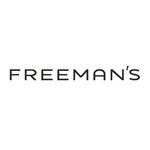[Americana] Allaire, Peter Alexander, Mini-Archive
About Seller
2400 Market St
Philadelphia, PA 19147
United States
Established in 1805, Freeman’s Auction House holds tradition close, with a progressive mind-set towards marketing and promotion, along with access to a team of top experts in the auction business. And now with offices in New England, the Southeast, and on the West Coast, it has never been easier to ...Read more
Two ways to bid:
- Leave a max absentee bid and the platform will bid on your behalf up to your maximum bid during the live auction.
- Bid live during the auction and your bids will be submitted real-time to the auctioneer.
Bid Increments
| Price | Bid Increment |
|---|---|
| $0 | $25 |
| $500 | $50 |
| $1,000 | $100 |
| $2,000 | $200 |
| $3,000 | $250 |
| $5,000 | $500 |
| $10,000 | $1,000 |
| $20,000 | $2,000 |
| $30,000 | $2,500 |
| $50,000 | $5,000 |
| $100,000 | $10,000 |
About Auction
Feb 18, 2021
A collection of important books and manuscripts curated by Darren Winston, Head of Department Books, Manuscripts, Photographs & Photobooks at Freeman's. Freeman's info@freemansauction.com
- Lot Description
[Americana] Allaire, Peter Alexander
Mini-Archive
New York, 1803-24. Mini-archive of seven items relating to New York merchant and purported British spy, Peter Alexander Allaire. Comprising his account book, dated 1803-05; three lease aggreements between Allaire and two New York City merchants, dated 1811-13; one partially printed appraisal document of Allaire's property, executed upon his death and signed by his children, George and Calicia Allaire, dated September 20, 1820; one MS. account book belonging to his son George Young Allaire, dated 1823-24; one copy of the quarterly magazine "Now and Then", April, 1948, containing Allaire's first person account of his arrest and imprisonment in the Bastille on suspicions of him being a spy for the British government.
Peter Alexander Allaire (1740-1820) was a New York merchant infamously known for also being a British spy during the American Revolution. He was jailed in the Bastille in February 1780 for purportedly trying to poison Benjamin Franklin with tainted madeira (see Claude-Anne Lopez, "The Man Who Frightened Franklin"). Released in May of that year, he was expelled from France and eventually made his way back to the Colonies. After the war he moved his family to Canada with the assistance of the British government. His activities as a British agent continued into the 1790s, with attempts to foment unrest on the frontier by encouraging separatist movements. He returned to New York in the 1790s, resuming his activities as a merchant.
- Shipping Info
-
No lot may be removed from Freeman’s premises until the buyer has paid in full the purchase price therefor including Buyer’s Premium or has satisfied such terms that Freeman’s, in its sole discretion, shall require. Subject to the foregoing, all Property shall be paid for and removed by the buyer at his/ her expense within ten (10) days of sale and, if not so removed, may be sold by Freeman’s, or sent by Freeman’s to a third-party storage facility, at the sole risk and charge of the buyer(s), and Freeman’s may prohibit the buyer from participating, directly or indirectly, as a bidder or buyer in any future sale or sales. In addition to other remedies available to Freeman’s by law, Freeman’s reserves the right to impose a late charge of 1.5% per month of the total purchase price on any balance remaining ten (10) days after the day of sale. If Property is not removed by the buyer within ten (10) days, a handling charge of 2% of the total purchase price per month from the tenth day after the sale until removal by the buyer shall be payable to Freeman’s by the buyer. Freeman’s will not be responsible for any loss, damage, theft, or otherwise responsible for any goods left in Freeman’s possession after ten (10) days. If the foregoing conditions or any applicable provisions of law are not complied with, in addition to other remedies available to Freeman’s and the Consignor (including without limitation the right to hold the buyer(s) liable for the bid price) Freeman’s, at its option, may either cancel the sale, retaining as liquidated damages all payments made by the buyer(s), or resell the property. In such event, the buyer(s) shall remain liable for any deficiency in the original purchase price and will also be responsible for all costs, including warehousing, the expense of the ultimate sale, and Freeman’s commission at its regular rates together with all related and incidental charges, including legal fees. Payment is a precondition to removal. Payment shall be by cash, certified check or similar bank draft, or any other method approved by Freeman’s. Checks will not be deemed to constitute payment until cleared. Any exceptions must be made upon Freeman’s written approval of credit prior to sale. In addition, a defaulting buyer will be deemed to have granted and assigned to Freeman’s, a continuing security interest of first priority in any property or money of, or owing to such buyer in Freeman’s possession, and Freeman’s may retain and apply such property or money as collateral security for the obligations due to Freeman’s. Freeman’s shall have all of the rights accorded a secured party under the Pennsylvania Uniform Commercial Code.
-
- Buyer's Premium



 EUR
EUR CAD
CAD AUD
AUD GBP
GBP MXN
MXN HKD
HKD CNY
CNY MYR
MYR SEK
SEK SGD
SGD CHF
CHF THB
THB![[Americana] Allaire, Peter Alexander, Mini-Archive](https://s1.img.bidsquare.com/item/l/7831/7831519.jpeg?t=1L71dM)
![[Americana] Allaire, Peter Alexander, Mini-Archive](https://s1.img.bidsquare.com/item/s/7831/7831519.jpeg?t=1L71dM)










